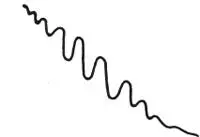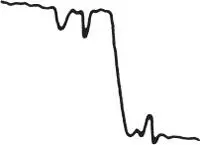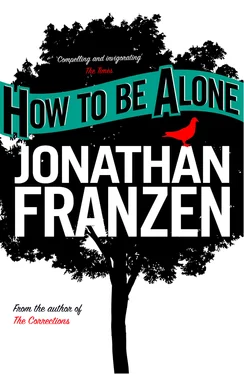This much of the evening was typically Alzheimer’s. Because children learn social skills very early, a capacity for gestures of courtesy and phrases of vague graciousness survives in many Alzheimer’s patients long after their memories are shot. It wasn’t so remarkable that my father was able to handle (sort of) my brothers’ holiday calls. But consider what happened next, after dinner, outside the nursing home. While my wife ran inside for a geri chair, my father sat beside me and studied the institutional portal that he was about to reenter. “Better not to leave,” he told me in a clear, strong voice, “than to have to come back.” This was not a vague phrase; it pertained directly to the situation at hand, and it strongly suggested an awareness of his larger plight and his connection to the past and future. He was requesting that he be spared the pain of being dragged back toward consciousness and memory. And, sure enough, on the morning after Thanksgiving, and for the remainder of our visit, he was as crazy as I ever saw him, his words a hash of random syllables, his body a big flail of agitation.
For David Shenk, the most important of the “windows onto meaning” afforded by Alzheimer’s is its slowing down of death. Shenk likens the disease to a prism that refracts death into a spectrum of its otherwise tightly conjoined parts—death of autonomy, death of memory, death of self-consciousness, death of personality, death of body—and he subscribes to the most common trope of Alzheimer’s: that its particular sadness and horror stem from the sufferer’s loss of his or her “self” long before the body dies.
This seems mostly right to me. By the time my father’s heart stopped, I’d been mourning him for years. And yet, when I consider his story, I wonder whether the various deaths can ever really be so separated, and whether memory and consciousness have such secure title, after all, to the seat of selfhood. I can’t stop looking for meaning in the two years that followed his loss of his supposed “self,” and I can’t stop finding it.
I’m struck, above all, by the apparent persistence of his will . I’m powerless not to believe that he was exerting some bodily remnant of his self-discipline, some reserve of strength in the sinews beneath both consciousness and memory, when he pulled himself together for the request he made to me outside the nursing home. I’m powerless as well not to believe that his crash on the following morning, like his crash on his first night alone in a hospital, amounted to a relinquishment of that will, a letting-go, an embrace of madness in the face of unbearable emotion. Although we can fix the starting point of his decline (full consciousness and sanity) and the end point (oblivion and death), his brain wasn’t simply a computational device running gradually and inexorably amok. Where the subtractive progress of Alzheimer’s might predict a steady downward trend like this—

what I saw of my father’s fall looked more like this:

He held himself together longer, I suspect, than it might have seemed he had the neuronal wherewithal to do. Then he collapsed and fell lower than his pathology may have strictly dictated, and he chose to stay low, ninety-nine percent of the time. What he wanted (in the early years, to stay clear; in the later years, to let go) was integral to what he was . And what I want (stories of my father’s brain that are not about meat) is integral to what I choose to remember and retell.
One of the stories I’ve come to tell, then, as I try to forgive myself for my long blindness to his condition, is that he was bent on concealing that condition and, for a remarkably long time, retained the strength of character to bring it off. My mother used to swear that this was so. He couldn’t fool the woman he lived with, no matter how he bullied her, but he could pull himself together as long he had sons in town or guests in the house. The true solution of the conundrum of my stay with him during my mother’s operation probably has less to do with my blindness than with the additional will he was exerting.
After the bad Thanksgiving, when we knew he was never coming home again, I helped my mother sort through his desk. (It’s the kind of liberty you take with the desk of a child or a dead person.) In one of his drawers we found evidence of small, covert endeavors not to forget. There was a sheaf of papers on which he’d written the addresses of his children, one address per slip, the same address on several. On another slip he’d written the birth dates of his older sons—“Bob 1–13–48” and “TOM 10–15–50”—and then, in trying to recall mine (August 17, 1959), he had erased the month and day and made a guess on the basis of my brothers’ dates: “JON 10–13–49.”
Consider, too, what I believe are the last words he ever spoke to me, three months before he died. For a couple of days, I’d been visiting the nursing home for a dutiful ninety minutes and listening to his mutterings about my mother and to his affable speculations about certain tiny objects that he persisted in seeing on the sleeves of his sweater and the knees of his pants. He was no different when I dropped by on my last morning, no different when I wheeled him back to his room and told him I was heading out of town. But then he raised his face toward mine and—again, out of nowhere, his voice was clear and strong—he said: “Thank you for coming. I appreciate your taking the time to see me.”
Set phrases of courtesy? A window on his fundamental self? I seem to have little choice about which version to believe.
IN RELYING ON MY MOTHER’S LETTERS to reconstruct my father’s disintegration, I feel the shadow of the undocumented years after 1992, when she and I talked on the phone at greater length and ceased to write all but the briefest notes. Plato’s description of writing, in the Phaedrus , as a “crutch of memory” seems to me fully accurate: I couldn’t tell a clear story of my father without those letters. But, where Plato laments the decline of the oral tradition and the atrophy of memory which writing induces, I at the other end of the Age of the Written Word am impressed by the sturdiness and reliability of words on paper. My mother’s letters are truer and more complete than my self-absorbed and biased memories; she’s more alive to me in the written phrase “he NEEDS distractions!” than in hours of videotape or stacks of pictures of her.
The will to record indelibly, to set down stories in permanent words, seems to me akin to the conviction that we are larger than our biologies. I wonder if our current cultural susceptibility to the charms of materialism—our increasing willingness to see psychology as chemical, identity as genetic, and behavior as the product of bygone exigencies of human evolution—isn’t intimately related to the postmodern resurgence of the oral and the eclipse of the written: our incessant telephoning, our ephemeral e-mailing, our steadfast devotion to the flickering tube.
Have I mentioned that my father, too, wrote letters? Usually typewritten, usually prefaced with an apology for misspellings, they came much less frequently than my mother’s. One of the last is from December 1987:
This time of the year is always difficult for me. I’m ill at ease with all the gift-giving, as I would love to get things for people but lack the imagination to get the right things. I dread the shopping for things that are the wrong size or the wrong color or something not needed, and anticipate the problems of returning or exchanging. I like to buy tools, but Bob pointed out a problem with this category, when for some occasion I gave him a nice little hammer with good balance, and his comment was that this was the second or third hammer and I don’t need any more, thank you. And then there is the problem of gifts for your mother. She is so sentimental that it hurts me not to get her something nice, but she has access to my checking account with no restrictions. I have told her to buy something for herself, and say it is from me, so she can compete with the after-Christmas comment: “See what I got from my husband!” But she won’t participate in that fraud. So I suffer through the season.
Читать дальше














